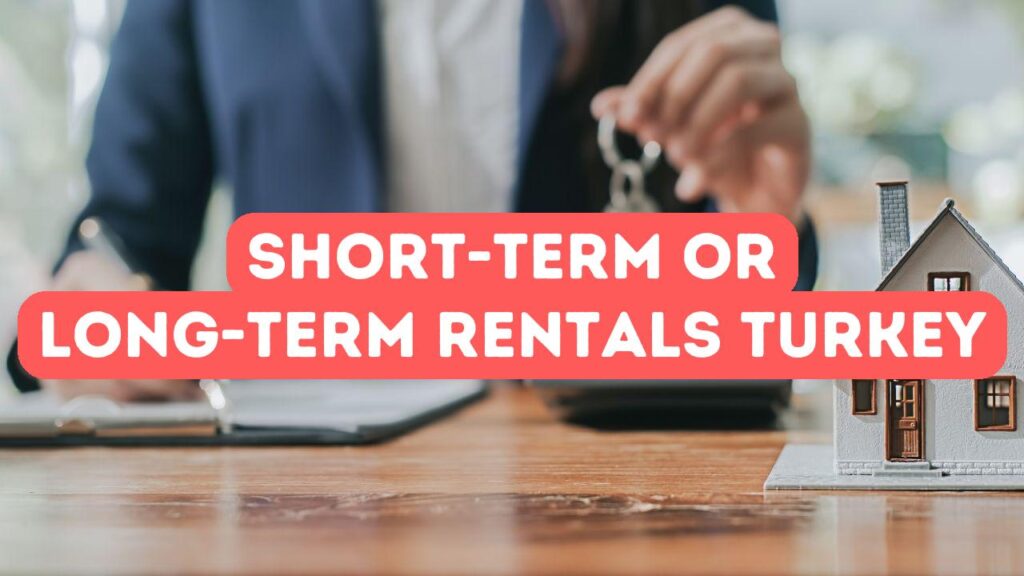In Turkey, the rental market is as vibrant as the Bosphorus at sunrise. When considering an investment, understanding the differences between short-term rentals Turkey and long-term rentals Turkey is crucial. The short vs long-term rentals debate pivots on distinct advantages. Short-term rentals can turn a quick profit, attracting tourists who seek flexibility. Conversely, long-term rentals promise steady income and less frequent tenant turnover. But which is more lucrative when investing in Turkish real estate? A rental market comparison reveals that Turkey’s scenic landscapes and rich history lure a diverse crowd, impacting demand heavily. Short-term rentals serve holidaymakers wanting a slice of Turkish paradise without the commitment. Meanwhile, long-term rentals cater to expats and locals seeking stability. Choosing the right path in this dynamic market requires strategic insight and a keen understanding of local trends. Thus, the right decision can be a linchpin for successful investments in Turkey.
Analyzing the Financial Benefits of Short-Term vs. Long-Term Rentals
Exploring the financial aspects of short-term rentals in Turkey reveals a tantalizing dance of opportunity and risk. Short-term rentals Turkey often boast higher nightly rates, catering to tourists seeking a taste of local culture. This can lead to substantial seasonal profits, depending on the tourism flux. Yet, these rentals require constant occupancy to outshine the dependable returns of long-term rentals Turkey. In a rental market comparison, stability emerges as a hallmark of long-term options, with a consistent income stream that’s less prone to the turbulence of tourist-demand shifts. When investing in Turkish real estate, the choice between short vs long-term rentals hinges on financial goals. If immediate, fluctuating income is appealing, short-term might be the ticket. However, for steady, reliable earnings, long-term rentals remain the bedrock of many portfolios. Understanding these dynamics is essential for a fruitful venture in Turkey’s diverse rental landscape.
Diving deeper into the financial benefits of short-term rentals in Turkey, these properties shine particularly during peak tourist seasons. Travelers often gravitate towards short-term rentals Turkey for their flexibility, leading owners to capitalize on high turnover rates and premium pricing. However, this sea of potential profits isn’t without its hidden rocks. Maintenance and customer service must be maintained to capture the busy tourist wave. On the flip side, long-term rentals Turkey serve up a more predictable feast. They provide a regular paycheck, immune to the ebb and flow of tourist seasons, which is a strong plus in any rental market comparison. For those investing in Turkish real estate, the short vs long-term rentals decision should align with their financial aspirations. Some investors might relish the thrilling ride of short-term gains, while others find peace in the steady march of long-term investments, creating a mosaic of opportunities in Turkey’s rental market.
Short-term rentals in Turkey can be a lucrative option, especially during bustling holiday seasons. These properties attract a steady stream of tourists, providing an avenue for robust pricing strategies. They offer owners the chance to play the market like a maestro directing a symphony, capturing profits akin to a crescending orchestra—exciting yet sometimes unpredictable. Still, these ventures demand a keen eye on local trends and swift adaptation to the shifts in tourism patterns. On the other side of the spectrum, long-term rentals Turkey offer a more serene melody. They embody financial stability, much like the dependable tick of a grandfather clock, delivering a constant rhythm of income. For those seeking diversification when investing in Turkish real estate, a rental market comparison shows that the short vs long-term rentals debate is a balancing act of risk and reward, requiring careful consideration of the investor’s unique financial goals.
Exploring Regulatory Challenges in Turkey’s Rental Market
Navigating Turkey’s rental market presents its own set of regulatory challenges that are crucial for investors. Each region may have diverse rules affecting both short-term rentals Turkey and long-term rentals Turkey. Short-term rentals, popular among tourists, often face stricter local regulations, reflecting residents’ concerns over noise and safety. Meanwhile, long-term rentals require compliance with tenant rights and lease agreements, balancing landlord interests with security for occupants. A rental market comparison can illuminate these issues, emphasizing why understanding regional differences is vital. For those investing in Turkish real estate, grasping these regulatory hurdles is akin to reading the fine print before signing a contract. Whether you’re eyeing short-term gains or long-term stability, recognizing legal nuances is key. Ultimately, the maze of rules is not a deterrent but a guide, helping investors choose wisely between short vs long-term rentals for successful ventures.
Understanding regulatory challenges in short-term rentals Turkey begins with acknowledging tourism’s impact. High demand for vacation homes drives tighter regulations, especially in bustling cities. These rules often include licensing requirements, limiting lease duration, and defining allowable zones. Conversely, long-term rentals Turkey tend to have more predictable regulatory paths, focusing on lease agreements and tenant rights, ensuring fair treatment for all parties involved. A rental market comparison exposes these distinctions, helping investors navigate complexities with ease. Investing in Turkish real estate means deciphering these regulations, balancing between short vs long-term rentals effectively. It’s vital to know when to capitalize on tourist influxes or when to rely on steady, longer-term leases. This knowledge is key to unlocking not just the potential income but the sustainability of your investment in Turkey’s dynamic rental market.
In Turkey’s bustling real estate landscape, the dichotomy between short-term rentals and long-term rentals is navigated carefully amidst a web of regulatory guidelines. Short-term rentals Turkey necessitate vigilance, as proprietors must familiarize themselves with stringent local codes. These often dictate inspection and licensing processes, which are the backbone of rental market comparison strategies. Perhaps surprising, long-term rentals Turkey offer a more lenient regulatory climate, yet still require detailed attention to tenant laws and lease documentation. This regulatory stew is essential knowledge for anyone investing in Turkish real estate. Understanding when to pivot from short to long-term strategies isn’t just beneficial—it’s essential. By mastering such intricacies, real estate investors can make informed decisions, avoiding pitfalls that could otherwise ensnare their ventures. In the fast-paced rental environment, discerning the right path is far more than a choice; it’s the foundation of success.
Understanding Market Demand: Is Short-Term or Long-Term More Profitable?
In navigating the landscape of Turkish real estate, understanding market demand is akin to reading the bustling streets of Istanbul. Short-term rentals Turkey capitalize on the seasonal waves of tourism, offering flexibility and often higher nightly rates. Long-term rentals Turkey, however, promise a steady, predictable income stream. It becomes a balancing act: the allure of quick profits versus the assurance of consistent revenue. A rental market comparison shows that tourist influxes during peak seasons make short-term options more profitable, but what about the quieter months? Investing in Turkish real estate requires foresight. Are you ready to seize the dazzling summer surge or lean into the stability of prolonged tenancy? The short vs long-term rentals choice can define your investment’s success, and deciphering this puzzle is key to tapping into Turkey’s rich real estate opportunities.
When pondering if short-term rentals Turkey hold more profit potential than long-term rentals Turkey, consider who you’re targeting. Do tourists frequent your locale? If yes, short-term options could be a gold mine, especially during peak travel seasons when they flock like bees to honey. These properties cater to those eager to dive into Turkey’s allure without a prolonged stay. Conversely, if your property appeals to locals or expats, long-term rentals offer a reliable cash flow with less hassle from constant tenant turnover. An effective rental market comparison weighs these factors meticulously. Investing in Turkish real estate means knowing your audience. Are you crafting bespoke experiences for vacationers or offering a homey nook for the long haul? The choice between short vs long-term rentals can be a financial game-changer. Which path aligns with your investment goals?
Tourism’s rhythm is a conductor in the symphony of short-term rentals Turkey. The hustle of holiday-goers provides a lucrative crescendo for those keen on capitalizing during peak seasons. Yet, every peak has its valley, and the off-season calm can test an investor’s patience. In contrast, long-term rentals Turkey offer a steady beat, with expats and locals anchoring income in predictable waves. A rental market comparison shows that each has its unique ebb and flow. Savvy investors in Turkish real estate gauge these tides, aligning with their financial aspirations. Short vs long-term rentals ask a fundamental question: prefer the season’s vibrant dance or the unwavering hum of a steady rhythm? This awareness dictates the tempo of your investments. Knowing which notes to play can be the catalyst for seizing Turkey’s real estate potential, ensuring your investment does more than just float—it sails smoothly.






